(完整word版)外研社小学英语一起小学五年级上语法总结及练习题
- 格式:doc
- 大小:54.88 KB
- 文档页数:3
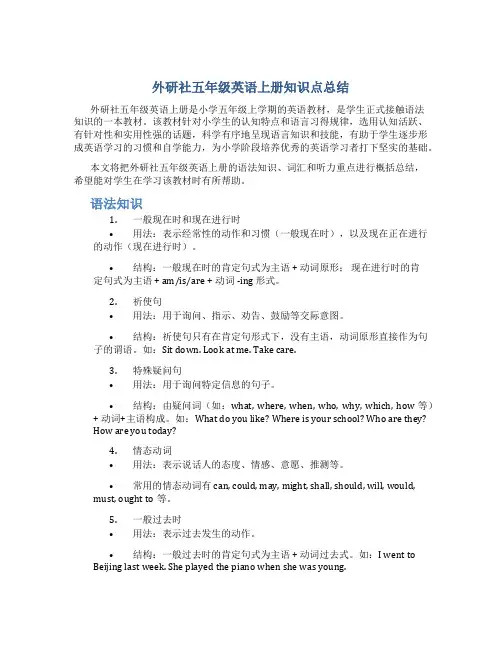
外研社五年级英语上册知识点总结外研社五年级英语上册是小学五年级上学期的英语教材,是学生正式接触语法知识的一本教材。
该教材针对小学生的认知特点和语言习得规律,选用认知活跃、有针对性和实用性强的话题,科学有序地呈现语言知识和技能,有助于学生逐步形成英语学习的习惯和自学能力,为小学阶段培养优秀的英语学习者打下坚实的基础。
本文将把外研社五年级英语上册的语法知识、词汇和听力重点进行概括总结,希望能对学生在学习该教材时有所帮助。
语法知识1.一般现在时和现在进行时•用法:表示经常性的动作和习惯(一般现在时),以及现在正在进行的动作(现在进行时)。
•结构:一般现在时的肯定句式为主语 + 动词原形;现在进行时的肯定句式为主语 + am/is/are + 动词 -ing 形式。
2.祈使句•用法:用于询问、指示、劝告、鼓励等交际意图。
•结构:祈使句只有在肯定句形式下,没有主语,动词原形直接作为句子的谓语。
如:Sit down. Look at me. Take care.3.特殊疑问句•用法:用于询问特定信息的句子。
•结构:由疑问词(如:what, where, when, who, why, which, how等)+ 动词+主语构成。
如:What do you like? Where is your school? Who are they?How are you today?4.情态动词•用法:表示说话人的态度、情感、意愿、推测等。
•常用的情态动词有can, could, may, might, shall, should, will, would, must, ought to等。
5.一般过去时•用法:表示过去发生的动作。
•结构:一般过去时的肯定句式为主语 + 动词过去式。
如:I went to Beijing last week. She played the piano when she was young.词汇1.动词根据动词的时态、语态、情态以及不同的动作主语,文章用到的动词有以下几类:•一般现在时动词(如:like, eat, drink等)•现在进行时动词(如:reading, playing, eating等)•一般过去时动词(如:went, saw, played等)•情态动词(如:can, could, may, might, will, would, must, should, have to等)•不规则动词(如:be, do, have, go等)2.名词•能力(如:ability, skill)•食品与饮料(如:food, drink)•身体部位(如:head, foot, arm, leg, eye, ear等)•动物(如:pet, rabbit, bird, turtle, panda, lion等)•学校(如:school, classroom, teacher, student, desk等)•时间(如:morning, afternoon, night等)3.形容词和副词•描述性的形容词(如:big, small, tall, short, long等)•表示感受和程度的形容词(如:happy, sad, excited, scared, tired等)•表示时间、地点、方式等副词(如:now, here, there, well, fast, slowly等)听力重点1.听懂人们之间的问候、介绍和谈话等基本交际用语。
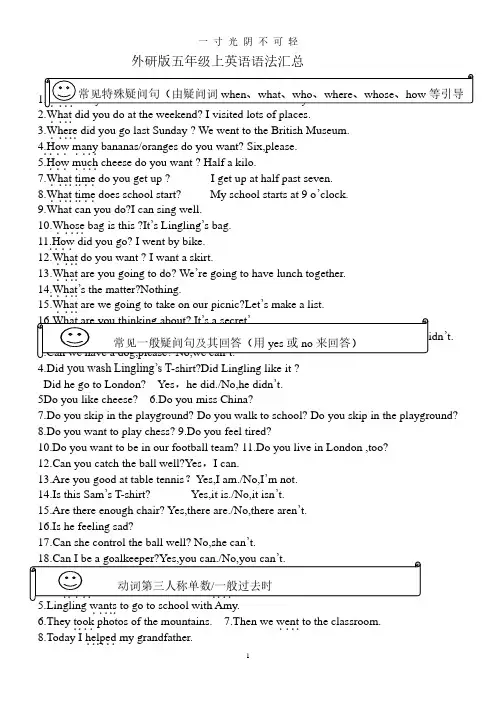
外研版五年级上英语语法汇总....3.Where ..... did you go last Sunday ? We went to the British Museum. 4.How many ........bananas/oranges do you want? Six,please. 5.How much ....... cheese do you want ? Half a kilo. 7.What time ........ do you get up ? I get up at half past seven. 8.What time ........ does school start? My school starts at 9 o ’clock. 9.What can you do?I can sing well.10.Whose ..... bag is this ?It ’s Lingling ’s bag. 11.H ..o .w .did you go? I went by bike.12.What ....do you want ? I want a skirt. 13.What ....are you going to do? We ’re going to have lunch together. 14.What .....’s the matter?Nothing. 15.What .... are we going to take on our picnic?Let ’s make a list. ’t. 4.Did you wash Lingling’s T -shirt?Did Lingling like it ?Did he go to London? Yes ,he did./No,he didn ’t.5Do you like cheese? 6.Do you miss China?7.Do you skip in the playground? Do you walk to school? Do you skip in the playground?8.Do you want to play chess? 9.Do you feel tired?10.Do you want to be in our football team? 11.Do you live in London ,too?12.Can you catch the ball well?Yes ,I can.13.Are you good at table tennis ?Yes,I am./No,I ’m not.14.Is this Sam ’s T-shirt? Yes,it is./No,it isn ’t.15.Are there enough chair? Yes,there are./No,there aren ’t.16.Is he feeling sad?17.Can she control the ball well? No,she can ’t......6.They took ....photos of the mountains. 7.Then we w .ent ... to the classroom. 8.Today I helped ......my grandfather.9.I dropped ....... my ice cream. 10.Yesterday I went .... to the park with sam and Amy. 11.I went .... to the zoo by bus. 12.Sam took ....my T-shirt. 13.Then we went .... by bus. 14.We bought ...... ice creams. 14.I went .... to the park. 15.I saw ...lots of places.16.I wenthome by bus.17.I boughttwenty-five pencils yesterday. 4.There are enough pencils. 5.There are not enough cars....2.This girl is deaf.She can ’t hear.This dog helps her..... 3.These firemen can ’t find people. These dogs help them...... 4.This little girl can ’t swim. Her mother helps her ... .. 5.This is my hat.It is mine. .....6.This is your T-shirt.It is yours....... 7.That is his big coat .It is his . 8.This is her sweater.It is hers. ............You shoul .....d hold my hand,too. 36.You sh ..ouldn .....’.t .walk in the road. You shouldn .......’.t . jump on the bed. 37.I can ...do it very well. She was three then.She couldn ......’.t . swim. 1. Can I have some water?I ’m thirsty. 2. I ’ve got a present.I ’m happy.3.I lost my favourite toy. I ’m sad.4. I want to eat a hamburger.I ’m very hungry.5.Can we play chess?I ’m bored.6.I played basketball.I ’m so tired.7.Today I won a chess game.Now I feel happy.8.Yesterday I lost my bag.I can ’t find it. I feel sad.9.I can smell some nice noodle soup. I feel hungry.10.It ’s raining and I can ’t go out to play.I feel bored.drop-dopped do-did come-came go-went meet-met buy-bought run-ran have-had eat-ate see-saw watch-watched win-won is-was are-were take-took get-got have-had。
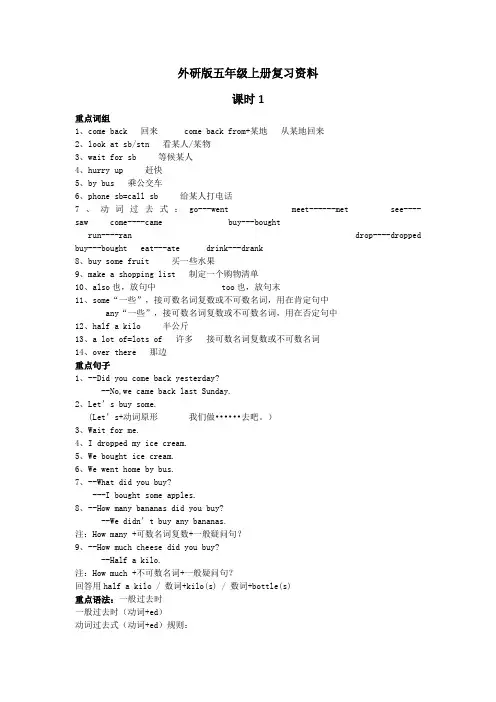
外研版五年级上册复习资料课时1重点词组1、come back 回来 come back from+某地从某地回来2、look at sb/stn 看某人/某物3、wait for sb 等候某人4、hurry up 赶快5、by bus 乘公交车6、phone sb=call sb 给某人打电话7、动词过去式:go---went meet------met see---- saw come----came buy---boughtrun----ran drop----dropped buy---bought eat---ate drink---drank8、buy some fruit 买一些水果9、make a shopping list 制定一个购物清单10、also也,放句中 too也,放句末11、some“一些”,接可数名词复数或不可数名词,用在肯定句中any“一些”,接可数名词复数或不可数名词,用在否定句中12、half a kilo 半公斤13、a lot of=lots of 许多接可数名词复数或不可数名词14、over there 那边重点句子1、--Did you come back yesterday?--No,we came back last Sunday.2、Let’s buy some.(Let’s+动词原形我们做••••••去吧。
)3、Wait for me.4、I dropped my ice cream.5、We bought ice cream.6、We went home by bus.7、--What did you buy?---I bought some apples.8、--How many bananas did you buy?--We didn’t buy any bananas.注:How many +可数名词复数+一般疑问句?9、--How much cheese did you buy?--Half a kilo.注:How much +不可数名词+一般疑问句?回答用half a kilo / 数词+kilo(s) / 数词+bottle(s)重点语法:一般过去时一般过去时(动词+ed)动词过去式(动词+ed)规则:1)一般情况直接加-ed :play---played2)以e结尾,去e 加-ed :like----liked3) 以辅音字母加y结尾,变y为i 加-ed :study----studied4)以辅-元-辅结尾的词,双写词末尾的辅音字母加-ed :drop---dropped5)不规则变化go---went meet------metsee---- saw come----came buy---bought run----ran随堂练习一、单项选择(10)( ) 1 Where _____ they go yesterday ? A do B did C does( ) 2 I didn’t buy _____ at all. A something B nothing C anything( ) 3 I went to the park and _____ lots of places . A saw B see C sees( ) 4 Did they meet John ? ______ . A Yes, they did . B No, he didn’t. C No, they did .( ) 5 Then we went home _____ bus . A on B in C by二、选择合适的答案(15)( ) 1 Did they go home by bike ? A No, I didn’t.( ) 2 Where did you go yesterday ? B Yes, he did .( ) 3 What did you see ? C I went to the park .( ) 4 Did you see a bus yesterday ? D Yes, I do .( ) 5 When did your father come back ? E I came back last Friday. ( ) 6 Do you live in London, too ? F No , they didn’t.( ) 7 Did John eat rice yesterday ? G We went home by bus . ( ) 8 How did you go home yesterday ? H I saw lots of places . ( ) 9 When did you come back ? I She watched TV.( ) 10 What did she do yesterday ? J He came back last Sunday.三、用所给单词的适当形式补全句子(10)1 He ____________________( buy ) a new house in Dalian last year.2 We ___________________ ( go ) home by bus yesterday.3 She has ___________________( get ) five story books.4 The boys are __________________( run ) in the park .5 They ___________________( eat ) some ice creams yesterday .四单项选择(20)( ) 1 ____ did you go to the zoo yesterday ? _____7:20. A When, On B How , At C When , At( ) 2 ____ you ____ to the park yesterday ? Yes , I did . A Do , go B Did , go C Did , went( ) 3 They are waiting ____me . A / B to C for( ) 4 ____ did you come back ? Last week . A What B When C How ( ) 5 Mike ____ his cap yesterday. A dropped B drops C droped( ) 6 How are you ? ______. A I’m fine. B Nice to meet you . C Hello. ( ) 7 This is our ____ friend, Lingling. A China B Chinese C the USA( ) 8 You ____ back from China ! A am B is C are( ) 9 Do you live in this city ? _____. A Yes, I did. B Yes, I do. C No, Ididn’t.( ) 10 ____ did you come back from London ? A When B Where C课时2重点词组1、at the weekend 在周末2、visit lots of places 参观许多地方3、take a boat trip 坐船旅行4、have a good day 度过愉快的一天5、one hour and twenty minutes一小时二十分钟6、the Great Wall 长城7、at ten o’clock在十点钟at+ 时间点在....点钟8、take a photo of sb/sth 给某人/某物拍照9、动词过去式:tell---told go----wenttake----took have----had10、buy sth for sb=buy sb sth 给某人买某物11、a pair of+复数一双a pair of shoes/socks 一双鞋/一双袜子a pair of shorts 一条短裤12、want to do 想要做某事13、动词过去式:buy---bought take---took lose---lost find---found fly---fleweat---ate ride--rode- meet---met重点句子1、--Where did you go?--We went to the British Museum.2、--How did you go to these places?--We went by bus.3、What did you do at the weekend?4、They arrived ther e at ten o’clock.5、Da Ming took a photo of his father.6、--What’s the matter?--I lost my cap.What’s the matter(with sb)?7、Let’s go and fly it.Let’s+动词原形。
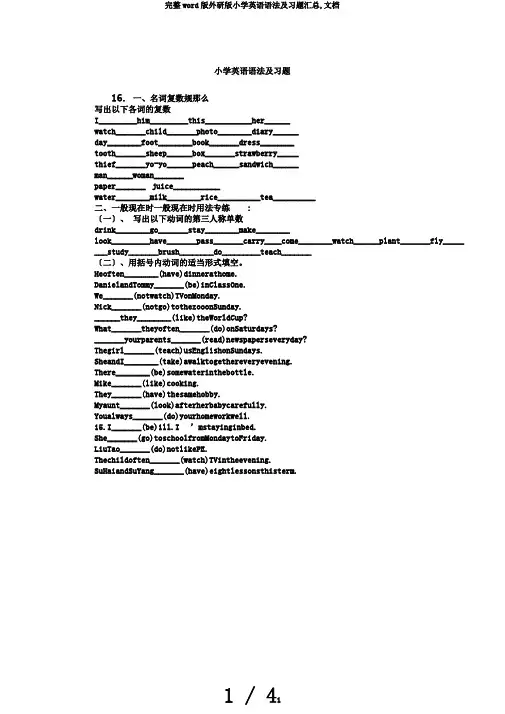
小学英语语法及习题16.一、名词复数规那么写出以下各词的复数I_________him_________this___________her______watch_______child_______photo________diary______day________foot________book_______dress________tooth_______sheep______box_______strawberry_____thief_______yo-yo______peach______sandwich______man______woman_______paper_______ juice___________water________milk________rice__________tea__________二、一般现在时一般现在时用法专练:〔一〕、写出以下动词的第三人称单数drink________go_______stay________make________look_________have_______pass_______carry____come________watch______plant_______fly_____ ___study_______brush________do_________teach_______〔二〕、用括号内动词的适当形式填空。
Heoften________(have)dinnerathome.DanielandTommy_______(be)inClassOne.We_______(notwatch)TVonMonday.Nick_______(notgo)tothezooonSunday.______they________(like)theWorldCup?What_______theyoften_______(do)onSaturdays?_______yourparents_______(read)newspaperseveryday?Thegirl_______(teach)usEnglishonSundays.SheandI________(take)awalktogethereveryevening.There________(be)somewaterinthebottle.Mike_______(like)cooking.They_______(have)thesamehobby.Myaunt_______(look)afterherbabycarefully.Youalways_______(do)yourhomeworkwell.15.I_______(be)ill.I ’mstayinginbed.She_______(go)toschoolfromMondaytoFriday.LiuTao_______(do)notlikePE.Thechildoften_______(watch)TVintheevening.SuHaiandSuYang_______(have)eightlessonsthisterm.20. -Whatday_______(be)ittoday?It’sSaturday.〔三〕、按照要求改写句子1.DanielwatchesTVeveryevening.(改为否认句)___________________________________________________2.Idomyhomeworkeveryday.(改为一般疑问句,作否认答复)________________________________________________________Shelikesmilk.(改为一般疑问句,作肯定答复)___________________________4.Amylikesplayingcomputergames.(改为一般疑问句,作否认答复)___________________________________________________5.Wegotoschooleverymorning.(改为否认句)_______________________________________________________6.HespeaksEnglishverywell.( 改为否认句)___________________________________________________7.Iliketakingphotosinthepark.( 对划线局部提问)________________________________________________________8.JohncomesfromCanada.(对划线局部提问)___________________________________________________9.Sheisalwaysagoodstudent.(改为一般疑问句,作否认答复)________________________________________________________10.SimonandDaniellikegoingskating.(改为否认句)___________________________________________________〔四〕、改错(划出错误的地方,将正确的写在横线上)1.Is yourbrotherspeakEnglish? __________________2.Doeshelikesgoingfishing? __________________3.Helikesplaygamesafterclass. __________________4.Mr.WuteachsusEnglish. __________________Shedon’tdoherhomeworkonSundays._________________三、现在进行时〔一〕、写出以下动词的现在分词:play________run__________swim_________make__________go_________like________ write_________ski___________read________have_________sing ________dance_________put_________see________buy_________love____________live_______take_________come________get_________stop_________sit________begin________shop__ _________〔二〕、用所给的动词的正确形式填空:boy__________________(draw)apicturenow.2.Listen .Somegirls _______________(sing)in theclassroom.3.Mymother_________________(cook)somenicefood now.4.What_____you______(do)now?Look.They_______________(have)anEnglishlesson.____________(not,water)theflowersnow.7.Look!thegirls________________(dance)intheclassroom.isourgranddaughterdoing?She_________(listen)tomusic.9.It ’s 5 o’clocknow.We_____________(have)suppernow10.______Helen____________(wash)clothes?Yes,sheis.〔三〕、句型转换:1.Theyaredoinghousework.(分别改成一般疑问句和否认句) ______________________________________________________________________________________________________________________2.Thestudentsarecleaningtheclassroom.(改一般疑问句并作肯定和否认答复)______________________________________________________________________________________________________________________3.I’mplayingthefootballintheplayground.(对划线局部进行提问)___________________________________________________________ 4.Tomisreadingbooksinhisstudy.( 对划线局部进行提问)四、将来时练习:填空。
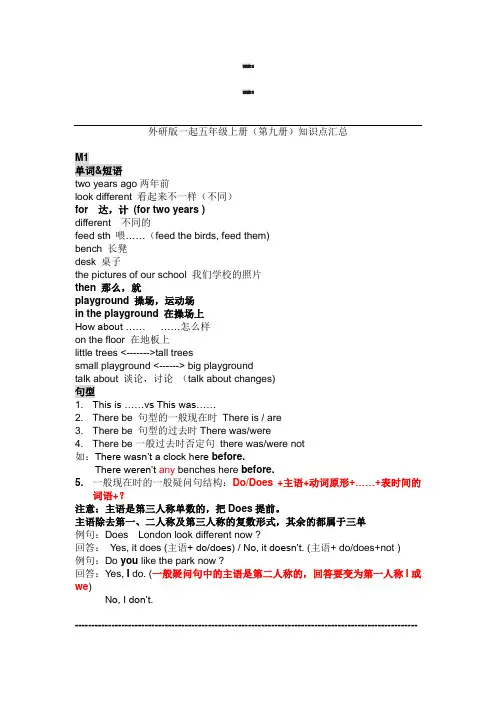
F o r p e s o n a u s e o n y s t u d y a n d r e s a r c h;n o t f r c o m me r c a u s eF o r p e s o n a u s e o n y s t u d y a n d r e s a r c h;n o t f r c o m me r c a u s e外研版一起五年级上册(第九册)知识点汇总M1单词&短语two years ago两年前look different 看起来不一样(不同)for 达,计(for two years )different 不同的feed sth 喂……(feed the birds, feed them)bench 长凳desk 桌子the pictures of our school 我们学校的照片then 那么,就playground 操场,运动场in the playground 在操场上How about …… ……怎么样on the floor 在地板上little trees <------->tall treessmall playground <------> big playgroundtalk about 谈论,讨论(talk about changes)句型1. This is ……vs This was……2. There be 句型的一般现在时There is / are3. There be 句型的过去时There was/were4. There be一般过去时否定句there was/were not如:There wasn’t a clock here before.There weren’t any benches here before.5. 一般现在时的一般疑问句结构:Do/Does +主语+动词原形+……+表时间的词语+?注意:主语是第三人称单数的,把Does提前。
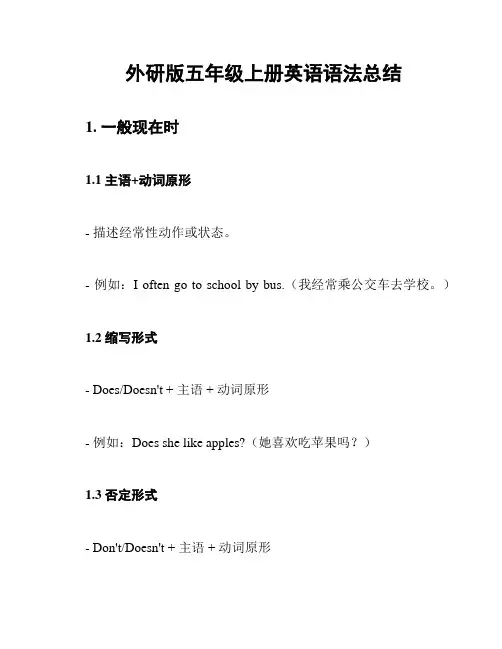
外研版五年级上册英语语法总结1. 一般现在时1.1 主语+动词原形- 描述经常性动作或状态。
- 例如:I often go to school by bus.(我经常乘公交车去学校。
)1.2 缩写形式- Does/Doesn't + 主语 + 动词原形- 例如:Does she like apples?(她喜欢吃苹果吗?)1.3 否定形式- Don't/Doesn't + 主语 + 动词原形- 例如:He doesn't like coffee.(他不喜欢咖啡。
)2. 一般过去时2.1 主语+动词过去式- 描述过去发生的动作或状态。
- 例如:I visited my grandparents last weekend.(我上周末拜访了我的祖父母。
)2.2 缩写形式- Did/Didn't + 主语 + 动词过去式- 例如:Did they go to the park?(他们去公园了吗?)2.3 否定形式- Didn't + 主语 + 动词过去式- 例如:She didn't answer my call.(她没有接我的电话。
)3. 一般将来时3.1 will + 动词原形- 描述将来发生的动作或状态。
- 例如:I will go to the movies this evening.(我今晚将去看电影。
)3.2 be going to + 动词原形- 描述计划、打算或预测的动作或状态。
- 例如:We are going to have a picnic this weekend.(我们这个周末将去野餐。
)4. 现在进行时4.1 主语+ be 动词 + 动词现在分词- 描述正在进行的动作或状态。
- 例如:She is reading a book.(她正在看书。
)4.2 缩写形式- Is/Isn't/Are/Aren't + 主语 + 动词现在分词- 例如:Is he cooking dinner?(他在做晚饭吗?)5. 现在完成时5.1 主语+ have/has + 过去分词- 描述已经完成的动作或状态。
外研社英语教材(一年级起点版)五年级上册知识点总结1. be的过去时表达be的过去时表达,Yuki - 外研社英语5年级上册(一年级起点版)There was / were 表示“过去有什么”① There is / isn't, There are / aren'tThere was / wasn't, There were / weren't②There was a bench here four years ago. (四年前这里有长凳。
)There were 20 bench es here four years ago. (四年前这里有20把长凳。
)③There wasn't a school here before. (以前,这里没有学校。
)There weren't any schools in this city before. (以前,这个城市没有任何学校。
)询问某人或某物的情况:陈述句:主语+ was / were + 形容词+ .④He was sad yesterday. (他昨天伤心了。
)一般疑问句:Was / Were + 主语+ 形容词+ ?⑤Were they naughty? (它们淘气吗?)--- Yes, they were. (是的,它们淘气。
)/ No, they weren't. (不,它们不淘气。
)(am / is - was, are - were, isn't - wasn't, aren't - weren't, bench - benches,'ch"结尾的名词变复数加"es"。
)2. 一般现在时问句:一般现在时问句,Yuki - 外研社英语5年级上册(一年级起点版)一般疑问句:Do / Does + 主语+ 动词原形...... + ?① Do you want to play basketball?(你想打篮球吗?)--- Yes, I do. (是的,我想。
小学五年级英语上册知识点梳理Module1短语:1、comeback回来comebackfrom+某地从某地回来2、lookatsb/stn看某人/某物3、waitforsb等候某人4、hurryup赶快bybus乘公交车6、phonesb=callsb给某人打7、动词过去式:go---went meet------metsee----saw come----came buy---boughtrun----ran drop----dropped句子:1、--Didyou comeback yesterday? --No,we cameback lastSunday.2、Let’sbuysome.(Let’s+动词原形我们做·去吧。
〕3、Waitforme.4、Idroppedmyicecream.5、Weboughticecream.6、Wewenthomebybus.语法:一般过去时一般过去时〔动词+ed〕动词过去式〔动词+ed〕规那么:1〕、直接加-ed比方:looked,played,2〕、去e加-ed比方:taked,rided(骑)3〕、变y为i加-ed比方:carry-carried,4〕、双写加-ed比方:5〕、不规那么变化比方:run-ran,swim-swam肯定句:Sb+动词过去式.否认句:Sb+didn’t(did not)+动词原形.一般疑问句:Did+sb+动词原形?Yes,sbdid./No,sbdidn’t.Module2短语:1、buysomefruit买一些水果2、makeashoppinglist制定一个购物清单3、also也,放句中too也,放句末4、some“一些〞,接可数名词复数或不可数名词,用在肯定句中any“一些〞,接可数名词复数或不可数名词,用在否认句中Ihave apples.Idon’thave apples.Doyouhave apples?5、halfakilo半公斤6、alotof=lotsof许多接可数名词复数或不可数名词7、overthere那边8、动词过去式:buy---bought eat---ate drink---drank句子:1、--Whatdidyoubuy?---Iboughtsomeapples.2、--Howmanybananasdidyoubuy?--Wedidn ’tbuyanybananas.注:Howmany+ 可数名词复数+一般疑问句?3、--Howmuchcheesedidyoubuy?--Halfakilo.注:Howmuch+ 不可数名词+一般疑问句?答复用halfakilo/ 数词+kilo(s)/ 数词+bottle(s)语法:特殊疑问句特殊疑问句构成:特殊疑问词+一般疑问句?答复时,根据具体情况答复。
外研版(一起)英语五年级上册(全) 词句练习Module 1一、写英文单词1. 长凳__________________________________2. 达,计__________________________________3. 不同的________________________________4. 那么,就_______________________________5. 操场,运动场___________________________二、写英文短语1. 在伦敦________________________________________________2. 有_____________________________________________________3. 一只大老鼠___________________________________________4. 看起来不同___________________________________________5. 喂鸟__________________________________________________6. 在中国________________________________________________7. 许多__________________________________________________8. 在我的家里___________________________________________9. 看_____________________________________________________10. 一个小操场__________________________________________11. 怎么样_______________________________________________12. 在教室里_____________________________________________13. 在地板上_____________________________________________14. 两年__________________________________________________15. 三个孩子_____________________________________________16. ……的照片___________________________________________三、翻译句子1. 这儿以前没有长凳。
外研版一起小学英语五年级上册第一学期语法试题第一题请给下列句子选择正确的动词形式填空:1. She _____________ (goes / go) to school every day.2. The dog _____________ (bark / barks) loudly.3. Tom often _____________ (help / helps) his mother with the housework.第二题选择最佳答案:1. ________ is your father? - He is a doctor.a) Whob) Whatc) When2. ________ are you going? - I am going to the park.a) Whatb) Wherec) When3. ________ time is it? - It is 3 o'clock.a) Whenb) Whatc) Why第三题按要求改写句子:1. This is my pencil case. (改为复数形式)2. I have a book. (改为否定句)3. She likes singing. (改为一般疑问句)第四题根据图片和句意,选择正确的单词填空:1. My mother is a ______ (doctor / teacher).2. The elephant has a long ______ (neck / tail).3. The girl is ______ (running / swimming) in the park.第五题完成下列句子:1. What ______ (do / does) your father do?2. I ______ (am / is) going to the cinema tonight.3. ______ (Does / Do) your sister play the piano?第六题选择正确的疑问词完成句子:1. ________ is your favorite color? - Blue.a) Howb) Whatc) Who2. ________ is your brother? - He is a teacher.a) Whatb) Whoc) Where3. ________ are you going? - I am going to the supermarket.a) Whenb) Wherec) What答题完毕,请继续努力学习,加油!。
外研社五年级上语法总结及练习题
I. There be 句型的一般现在时与一般过去时
1. There be一般现在时:
表示:在某地有某物或某人/ 某物或某人在某地
构成:在there be句型中,be动词用什么由紧跟在be动词后的那个名词决定肯定句:There is + 可数名词单数/不可数名词+地点
There are + 可数名词复数+地点
否定句:There isn’t + 可数名词单数/不可数名词+地点
There aren’t + 可数名词复数+地点
一般疑问句:Is/Are there + 名词+地点+地点?
肯定回答/否定回答:Yes, there is/are. No, there isn’t/aren’t.
针对数量提问的特殊疑问句:How many+名词复数+are there+地点?
How much+不可数名词+is there+地点?
2. There be一般过去时:
表示:过去某地有某人或某物/ 某物或某人在某地
时间状语:a. yesterday,morning(afternoon,evening)等;
b.由“last+一时间名词”构成的短语:last night,last year(winter,month,week)等;
c. 由“时间段+ago”构成的短语:a moment ago,a short time ago,an hour ago等
肯定句:There was + 可数名词单数/不可数名词+地点
There were + 可数名词复数+地点
否定句:There wasn’t + 可数名词单数/不可数名词+地点
There weren’t + 可数名词复数+地点
一般疑问句:Was / Were there + 名词+地点+地点?
肯定回答/否定回答:Yes, there was / were. No, there wasn’t / weren’t.
针对数量提问的特殊疑问句:How many+名词复数+were there+地点?
How much+不可数名词+was there+地点?
*就近原则:在there be句型中,be动词用单数还是复数取决于离它最近的那个名词的数量例如:There is a book and some pencils on the desk.
=There are some pencils and a book on the desk.
用there be的适当形式填空
1. a bottle of coke on the table yesterday.
2. What's in the bottle? some lucky Stars.
3. any sweets in it just now? No, .
4. How many students in the library? fifty.
5. some water in the bottle.
6. a lot of apple juice in the box.
7. lots of apple pies in the fridge last week.
8. much milk in the box? Yes, .
9. a bunch of flowers in the vase last night.
10. a supermarket behind my school before.
选择填空
1. There some bread on the plate a moment ago.
A. was
B. has
C. is
2. There any green trees in the park before.
A. are
B. weren’t
C. were
3. There two eggs in the fridge this morning, but now there only one.
A. are, is
B. were, was
C. were, is
4. There a heavy rain the day before yesterday.
A. is
B. was
C. will be
5. There a big desk and some small desks in the classroom.
A. is
B. are
C. has
6. There three cups and a teapot on the table.
A. is
B. are
C. have
7. there any water in the glass last night? Yes, .
A. Is, there’s
B. Are, there is
C. Was, there was
8. There was a lot of in the fridge.
A. meat
B. vegetable
C. eggs
9. There any children in the park.
A. are
B. aren’t
C. isn’t
10. There aren’t books in the bookcase.
A. some
B. a lot of
C. many
II.can和could
1. can 表示现在的能力,could 表示过去的能力,
例如:He can speak a little English now.
2. 在表示请求许可时,没有时间区别,在语气上could 更加委婉客气,
例如:Can I use your bike?
3. 在表示可能性方面,没有时间区别,can 可能性比could 大
选择填空
1.At that time we thought the story not be true.
A. could
B. must
C. can
2.You the work better in the future.
A. could did
B. can do
C. could do
3. I ride a bike last summer.
A. can't
B. couldn't
C. mustn't
4.Mary my letter, because she is worrying about it now.
A. should n’t receive
B. can’t receive
C. couldn't receive
5.Mr. Wang write last year, he was ill for three years.
A. mustn't
B. couldn't C can't
6.Could I sit here? Yes, of course you .
A. can
B. could
C. must
III. should
should是情态动词,表示义务、责任、常译为“应当”,“应该”,或表示一种估计的情况,后面加动词原形
肯定句:主语+ should + 动词原形+其他
否定句:主语+ shouldn’t + 动词原形+ 其他.
一般疑问句:Should +主语+ 动词原形+其他?
肯定回答/否定回答:Yes, 主+ should. / No, 主+ shouldn’t
用should, shouldn’t, can , can’t 填空
1. Sally is too thin. She eat more.
2. I speak English well.
3. You wash your hands after going to toilet.
4. He ride a bicycle, so he goes to school by bus.
5. You make a mess in the classroom.
6. We go to bed before 9 o’clock. We’ll have a test tomorrow morning.
IV.名词性物主代词
名词性的物主代词在句中起名词的作用, 可以单独使用, 相当于”形容词性的物主代词+名词", 如:Your shoes are white. Mine are black. (Mine=My shoes) 你的鞋子是白色的.我的是黑色的。
1. I can find my homework,but where’s_________?(you)
2. Look!Those stamps are_________.(he)
3. Is this_________skirt?(you)No,it’s not_________.(I)
4. That is not_________computer.That one is very old,but_________is new. (I)
5. ________(you)eyes are blue. ________(I)are black.
6. Is this guitar________(you).。